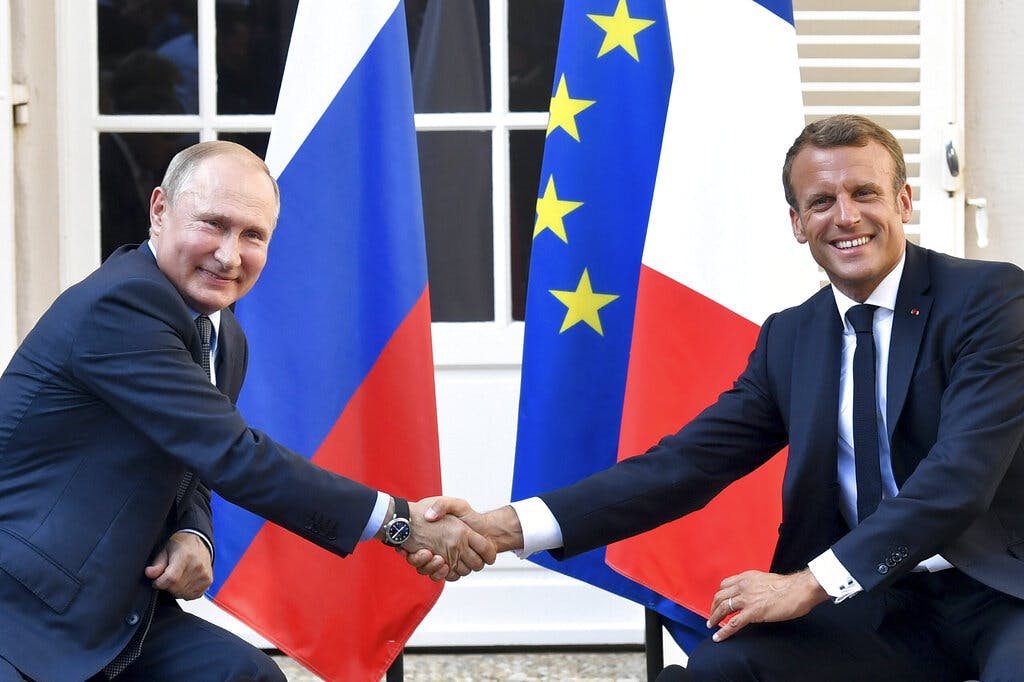Are French Flubs Over Ukraine Pushing Paris to Europe’s Sidelines?
What unites Erdoğan and Macron and many French thought leaders are certain ideas about NATO, some of which are squarely at odds with the general view from Washington.

Despite all the time the recently re-elected French president has spent on the phone with his counterpart in the Kremlin, Russia today expelled 34 French diplomats from Moscow. It seems like the more France tries to placate Vladimir Putin despite the mayhem he has unleashed in Ukraine, the closer it becomes to being an outcast in the European political arena.
Paris deplored the Russian move today as an unjustified response to the decision in April to expel “several dozen Russian agents acting on our territory under diplomatic status and working against our security interests,” Reuters reported. Russia was also expelling a significant number of diplomats from Italy and Spain.
If the French thought that President Macron’s much-derided outreach to Mr. Putin could insulate them from the Kremlin’s ire, the expulsions served as a reminder that while such a tack may look good on paper, in practice it can falter. While Mr. Macron likes to portray himself as an arbiter of peace, when Kyiv and Moscow have been brought to the table it has notably been thanks more to the efforts of Turkey’s autocratic president, Tayyip Erdoğan.
What unites Messrs. Erdoğan and Macron and many French thought leaders are certain ideas about NATO, some of which are squarely at odds with the general view from Washington. While Mr. Erdoğan has stated misgivings about allowing the Western military alliance to expand to include Finland and Sweden, some see that as an effort mainly to score political points at home. Yet the leader of a nationalist party allied with Mr. Erdogan, Devlet Bahceli, said it is better to keep Nordic countries in the “waiting room” so as to avoid alienating Russia and throwing fire on the flames already consuming much of Ukraine — a position many share in France.
Speaking on LCI television recently, a former French education minister, Luc Ferry, called Finland and Sweden’s new warming to NATO an example of an American victory at the expense of Europe that risks provoking Mr. Putin. Also, a professor of American history at the Sorbonne, André Kaspi, wrote in the French weekly Marianne that “for the United States, this war in Europe is excellent business.”
These are not minority views: As reported by the Times of London’s Paris correspondent, Charles Bremner, 60 percent of French voters in the first round of last month’s presidential election backed anti-NATO, Russophile candidates, led by Jean-Luc Mélenchon on the left and Marine Le Pen and Éric Zemmour on the right.
Then there’s the military assistance to Ukraine — or lack thereof. France’s aid to Ukraine has to date been only about half that of Britain’s, the Times of London reported. That lesser contribution is in keeping with Mr. Macron’s assertion that Mr. Putin must not be “humiliated.” Also, in a faux pas that is widely seen as a glaring omission in European diplomacy, neither Mr. Macron nor any French minister has traveled to Kyiv to meet with the Ukrainian president, Volodymr Zelensky, since Russia invaded Ukraine.
It is not clear, however, what kind of welcome he would receive were he to make the journey. In a direct criticism of the French president over the weekend, Mr. Zelensky told an Italian television station, “We won’t help Putin save face by paying with our territory.”
Also snapping back at the Élysée Palace’s kid-glove treatment of the generally reviled Russian leader have been the leadership of Poland and, more lately, Latvia. On Sunday Latvia’s foreign minister, Edgars Rinkevics, tweeted, “In 1939 it was called appeasement, in 2022 it is called face saving, let us not make the same mistakes again.”
So what gives? If the French position toward the Kremlin teeters between incomprehensible and reprehensible, a bit of post-World War II history offers clues. In 1966 Charles de Gaulle hacked France out of NATO’s integrated military command — a move that was either audacious or ridiculous, depending on one’s outlook. By that time, though, France had its own nuclear weapons, and with such acquisitions come swagger. Paris then also cultivated a different kind of relationship with Moscow than did London or Washington.
In 2009 the French president, Nicholas Sarkozy, “made the most symbolic foreign policy gesture of his presidency by announcing France’s return to NATO’s military command, and reversing Charles de Gaulle’s decision to walk out in protest at US domination,” as the Guardian newspaper wrote. That does not mean the move earned him the love of the French.
In a recent tweet, a former French ambassador to Washington, Gérard Araud, said that “the US wants to have the cake and eat it. Although they pay lip service to it, they have in fact fiercely opposed any European move towards strategic autonomy.”
Yet while major American corporations have pulled out of Russia left and right — McDonald’s restaurants being only the latest — few French firms have followed suit. If anything, Mr. Macron has discouraged heavyweight French corporations like hotel group Accor and housewares purveyor Leroy Merlin — one branch of which, at Kyiv, was actually bombed early in the war — from giving Mr. Putin the slip.
France under Mr. Macron’s stewardship is promoting “a new European security architecture,” as he put it recently, with Paris ostensibly at the head of the table. As the casualties mount and Russian destruction blights Ukraine, though, that high-minded stance may not only backfire but eventually could see the putative chefs of latter-day Gaullist aspirations relegated to doing the dishes.

